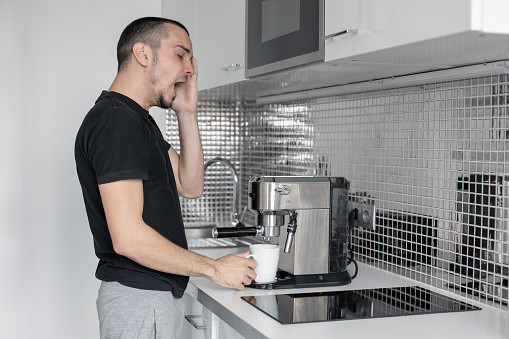The relationship between caffeine, coffee, and sleep is complex and may have a variety of causes. While caffeine is a common stimulant, some studies have indicated that it hurts sleep quality. Regular caffeine consumption decreases sleep quality and length. The effects of caffeine on sleep include increased waking and shallower sleep in the active phase. Caffeine can alter your sleep pattern and interfere with REM sleep. The effects of coffee and sleep are mutually exclusive, so there is still some debate over whether a relationship between caffeine and sleep is real.
The caffeine found in coffee and other beverages may affect melatonin production and sleep. These hormones regulate a 24-hour rhythm that affects how well we sleep. Both the external cycle of day and night and internal cellular processes contribute to the circadian rhythm. One of these processes involves the buildup of adenosine in the body. Moreover, caffeine interferes with this process, which may affect sleep quality.
Caffeine can disrupt your sleep if consumed before bedtime. When taken in large quantities, caffeine causes fragmentation in sleep. You wake up for several brief periods throughout the night, rather than one prolonged sleep. Because this occurs more frequently if you drink caffeine earlier in the day, you may not make the connection between caffeine and poor quality of sleep later on. In addition to its negative effects, caffeine may also increase the risk of cardiovascular disease, which may lead to insomnia.
Reasons Why Coffee Makes You Sleepy
In addition to being a natural mood enhancer, drinking coffee can help you lose weight. The chemical, caffeine, can reduce your appetite and curb cravings. Coffee increases dopamine levels, which control your brain’s pleasure center. It may also help lower your risk for Alzheimer’s disease. Alzheimer’s is a leading cause of dementia in seniors. It is caused by the deterioration of the neurons that produce dopamine. Both Parkinson’s disease and Alzheimer’s disease are incurable conditions.
Caffeine blocks adenosine receptors
Coffee contains an amino acid called adenosine, which regulates our sleep and wake cycle. This amino acid binds to certain receptors in the brain. When caffeine binds to those receptors, it blocks their function. Essentially, caffeine prevents adenosine from doing its job and making us sleepy. Over time, caffeine users build a tolerance to caffeine and can become sleepy with little or no sleep.
Caffeine can trigger a stress response
Whether you’re stressed about your job or just want to feel more rested, caffeine has an impact on the brain. Caffeine raises levels of epinephrine, the hormone responsible for the fight or flight response. This hormone affects many basic body processes and increases the likelihood of sleeplessness. Taking a break from caffeine may help reduce stress and sleepiness. But it shouldn’t be your only concern.
Caffeine can trigger a sleep disturbance
One of the greatest joys of life is caffeine, but it’s important to limit its intake before bed or you’ll face problems sleeping. Caffeine can disturb your sleep drive and circadian rhythm, causing you to stay awake long after the caffeine in your drink has metabolized. If you have caffeine sensitivity, you may want to limit your caffeine intake after noon. In general, you’ll want to avoid caffeine before bed, but it depends on your body. Caffeine can also cause you to see weird dreams and nightmares.
Caffeine can trigger a drowsiness response
Caffeine increases the production of adrenaline, the substance behind the “fight or flight” response. While this is great when a bear is chasing you, it is not a good idea if you’re trying to work, study, or study during the day. It can also trigger jitters and other symptoms. It’s best to avoid caffeine in the morning and after midday when cortisol levels are at their highest.
Ways To Minimize Coffee Effects
Limit Your Intake
Limit the number of cups of coffee you drink each day by gradually cutting back on how much you consume each day. You should aim to limit your daily caffeine intake to three to four eight-ounce 240-mL cups of brewed coffee. It may help to plan your day and have a designated time when you will drink your coffee to minimize the caffeine effects. Try to drink one or two cups in the morning and one in the afternoon. If you are still drinking coffee in the evenings, blend decaf with each cup.
Stay Hydrated
Other methods to minimize the effects of caffeine include water consumption, hydration, mindfulness, and eating fiber-rich foods. If you must drink caffeine, it’s best to limit its intake until your symptoms have subsided. However, it’s important to keep in mind that the half-life of caffeine is five to six hours. This means that the caffeine in coffee consumed at 4 p.m. will still be present in your bloodstream by 10 p.m.
While water can help alleviate the effects of coffee, reducing your caffeine intake may not be as easy. Caffeine is a stimulant and can cause many symptoms, including a pounding headache, anxiety, and gastrointestinal discomfort. If you have experienced an overdose, make sure you seek medical attention immediately. You may experience symptoms of caffeine poisoning or be at risk of a heart attack. In these cases, there are several ways to minimize the coffee effect.
In Conclusion
It is important to know the proper limit for caffeine in the diet. In healthy adults, 400 milligrams a day is considered safe. For pregnant women, however, the recommended limit is 200 mg. Children can consume less than half of that amount. As long as they drink enough water, caffeine does not pose a health risk. Even if you do consume coffee, it is best to limit the amount to two to three cups each day.


